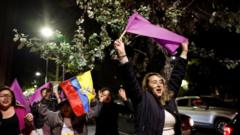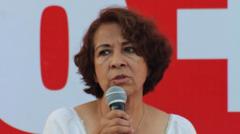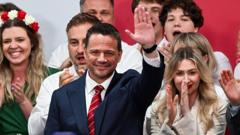Noboa aims to continue military efforts against gangs while facing economic challenges and a polarized electorate.
Ecuador's President Daniel Noboa Secures Re-Election Amid Controversy

Ecuador's President Daniel Noboa Secures Re-Election Amid Controversy
President Daniel Noboa's re-election comes with claims of election fraud and ongoing gang violence.
Ecuador’s center-right President Daniel Noboa has officially secured his position in the run-off of Ecuador's presidential election, marking the beginning of a full four-year term after assuming power following a snap election in November 2023. Noboa, who heralded his victory as "historic," decisively claimed approximately 56% of the vote, surpassing his left-wing opponent, Luisa González, who immediately contested the results by alleging fraud without presenting substantive evidence.
His administration has thus far been characterized by aggressive measures against rampant gang violence, which has made Ecuador one of the most dangerous nations in South America. In his victory speech, Noboa emphasized that the result was a testament to the hard work of his campaign team, stating, "A victory of more than ten points and over 1 million votes leaves no doubt as to who the winner is." Continuing his approach, he plans to accelerate military operations against criminal organizations, which include deploying armed forces to maintain order in urban areas and increasing prison capacities.
Despite these efforts, violence remains a significant concern. During Noboa's initial months in office, over 780 homicides were recorded in January alone, signifying a troubling start to the year. Voter surveys prior to the election indicated that security issues were paramount, influencing many citizens' decisions at the polls.
In his fight against the gangs, Noboa has sought international support, suggesting collaboration with foreign military forces from nations like the United States and European countries. He has also floated the idea of constitutional changes to permit the re-establishment of foreign military bases, a contentious topic given the prior tenure of Rafael Correa—González's political mentor—who ended their presence.
Amidst this sociopolitical backdrop, Noboa has outlined ambitious plans for economic reform, proposing investments in renewable energy to reduce Ecuador's dependency on hydropower, which has suffered from severe droughts and energy shortages. He faces the dual pressure of addressing violent crime while boosting employment opportunities to stave off public unrest and dissatisfaction.
González, reflecting upon her loss, described it as a failure of democracy and demanded a recount to check the legitimacy of the electoral process. The polarized outcome could further complicate Noboa’s governance as he has to navigate a landscape where many voters reminisce about the perceived stability and economic progress during Correa's presidency.
The polarization within Ecuador reflects broader divisions regarding governance styles and economic philosophies, as Noboa is criticized for authoritarian tendencies while critics of González associate her with Correa’s controversial legacy. The road ahead for Noboa may prove to be laden with challenges, requiring him to demonstrate effective leadership in a fractured nation yearning for both security and stability.
His administration has thus far been characterized by aggressive measures against rampant gang violence, which has made Ecuador one of the most dangerous nations in South America. In his victory speech, Noboa emphasized that the result was a testament to the hard work of his campaign team, stating, "A victory of more than ten points and over 1 million votes leaves no doubt as to who the winner is." Continuing his approach, he plans to accelerate military operations against criminal organizations, which include deploying armed forces to maintain order in urban areas and increasing prison capacities.
Despite these efforts, violence remains a significant concern. During Noboa's initial months in office, over 780 homicides were recorded in January alone, signifying a troubling start to the year. Voter surveys prior to the election indicated that security issues were paramount, influencing many citizens' decisions at the polls.
In his fight against the gangs, Noboa has sought international support, suggesting collaboration with foreign military forces from nations like the United States and European countries. He has also floated the idea of constitutional changes to permit the re-establishment of foreign military bases, a contentious topic given the prior tenure of Rafael Correa—González's political mentor—who ended their presence.
Amidst this sociopolitical backdrop, Noboa has outlined ambitious plans for economic reform, proposing investments in renewable energy to reduce Ecuador's dependency on hydropower, which has suffered from severe droughts and energy shortages. He faces the dual pressure of addressing violent crime while boosting employment opportunities to stave off public unrest and dissatisfaction.
González, reflecting upon her loss, described it as a failure of democracy and demanded a recount to check the legitimacy of the electoral process. The polarized outcome could further complicate Noboa’s governance as he has to navigate a landscape where many voters reminisce about the perceived stability and economic progress during Correa's presidency.
The polarization within Ecuador reflects broader divisions regarding governance styles and economic philosophies, as Noboa is criticized for authoritarian tendencies while critics of González associate her with Correa’s controversial legacy. The road ahead for Noboa may prove to be laden with challenges, requiring him to demonstrate effective leadership in a fractured nation yearning for both security and stability.






















